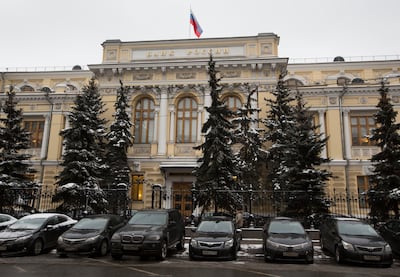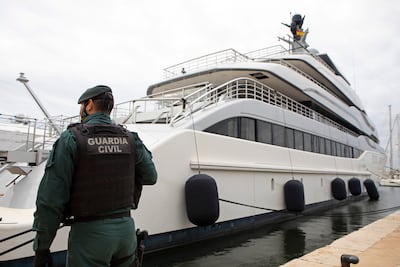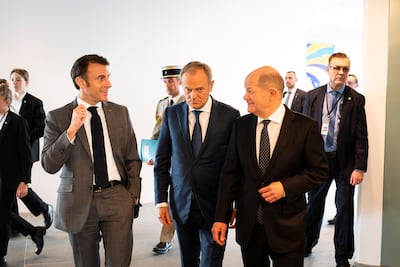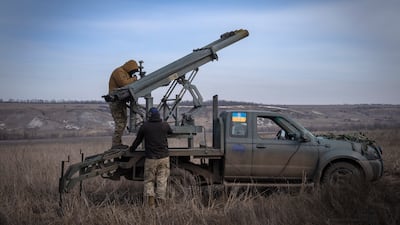The EU hopes to use profits from frozen Russian assets to raise more than $2 billion a year in military aid for Ukraine.
A 97 per cent windfall tax is proposed on the interest earned by Russian funds as they idle in a Belgian clearing house.
The money had initially been earmarked for Ukraine’s reconstruction, but most of it is now intended for weapons, under plans to be discussed by EU leaders on Thursday.
They were told by European Council president Charles Michel that their “foremost task” at a two-day summit is to equip Ukraine’s outgunned armed forces.
German Chancellor Olaf Scholz said he will lobby for the funds to be “concentrated on the things Ukraine most urgently needs right now”, such as ammunition and weapons.
The proposal is sure to disappoint some G7 and Ukrainian officials as it stops well short of confiscating Russia's central bank assets, worth about $200 billion.
Instead, it only deals with the profits they generate, and only since February this year, as officials try to make it legally sound in case Moscow mounts a court challenge.
The amount is further whittled down by Belgian taxes and leaving some leeway for the clearing house, Euroclear.

Officials expect to raise about €2.5 billion ($2.71 billion) this year if the plan is approved by EU member states.
It is understood 90 per cent would go to an arms purchasing fund and 10 per cent to other EU spending on Ukraine.
That would mean about $2.43 billion going on the military this year as pressure piles on Europe to counter Russia’s war economy.
The EU last month ordered European financial institutions to ring-fence profits on Russian central bank funds and not distribute them to shareholders.
Officials spoke at the time of using the funds for Ukraine's “recovery and reconstruction”, but the aim is now to put them to military use as soon as this summer.
European Commission president Ursula von der Leyen spoke in favour of the change in priorities, saying there could be “no greater use for that money than to make Ukraine and all of Europe a safer place to live”.

Ukraine is seeking ammunition for its war effort but US support has stalled and the EU missed a target to provide a million artillery shells.
“We face a pivotal moment. Urgency, intensity and unwavering determination are imperative,” Mr Michel wrote in an invitation letter to the EU summit.
“We must focus on effectively implementing and enforcing our sanctions, as well as advancing our efforts on the use of windfall profits from immobilised assets.”
The idea of repurposing Russian assets has been on the table since the 2022 invasion but became bogged down in legal discussions.
The US has urged its allies in the G7 to find ways to “unlock the value” of sanctioned Russian funds.
Britain’s Foreign Secretary David Cameron has floated the idea of using the Russian assets as collateral to loan money to Ukraine.
The UK and US suggest such actions could be justified as a legally valid response to Russian aggression.
But the EU is reluctant to go further than a tax on profits amid fears of harming the euro’s reputation as a safe currency.
Moscow fanned those fears on Wednesday, warning the use of its assets would be an “unprecedented violation” of international law.
“The Europeans are well aware of the damage such decisions could do to their economy, their image, their reputations as reliable guarantors,” said Kremlin spokesman Dmitry Peskov.
“They will become the target of prosecution for many decades.”

About two-thirds of the Russian bank's frozen assets are held in the EU, mostly in euros, while more than 1,700 people have been personally sanctioned.
The amount held in other countries has been estimated at between $40 and $60 billion in the US and $33 billion in the UK.
Euroclear is already dealing with lawsuits in Moscow but EU officials believe there are no grounds to challenge the latest proposal.
It is argued that it amounts to no more than a requirement for Euroclear to pay its extraordinary profits into the EU budget, with no implications for Russia.
“The frozen assets are not just sitting there, they are generating unexpected profits, and now we are using them for Ukraine’s defence,” said Mr Scholz.
Euroclear would be asked to pay twice a year, with leeway to hold back up to 10 per cent if its Russian legal battles prove costly.
The 97 per cent tax also leaves Euroclear with what is regarded as a small incentive to manage the system properly.
Ukraine, in turn, wants to see the “full confiscation or other use of all other assets”, said Prime Minister Denys Shmyhal on a visit to Brussels.
“Europe and the world need an effective precedent for making the aggressor pay a heavy price for the destruction it has caused in Ukraine,” he said.

